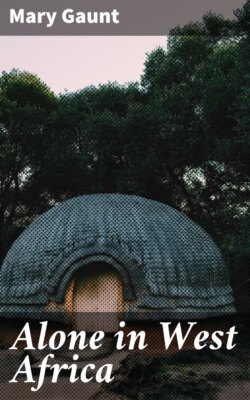Читать книгу Alone in West Africa - Mary Gaunt - Страница 25
На сайте Литреса книга снята с продажи.
Оглавление
They bear a strong family resemblance to the capital, only they are “more so.” The tribes see to it, I believe, that there is no communication with the capital except by sea, and the little communities with their pretensions to civilisation are far less ininteresting than the people of an Ashanti village who have seldom or never seen a white man.
I landed at Lower Buchanan, Grand Bassa, early one morning. The beach simply reeked of human occupancy. They do not trouble about sanitation in Liberia, and the town itself looked as if the houses had been set down promiscuously in the primeval bush. Perhaps there were more signs of wealth than in Monrovia, for I did see three cows and at least half a dozen hairy, razor-backed pigs on the track that was by courtesy the principal street, and it must require something to support all the churches.
I suppose it is the emotional character of the negro that makes him take so largely to religion, or rather, I think I may say, the observances of religion. The question of the missionaries is a vexed one, and on board the Chama was a missionary who made me think. She was a pretty young girl who had left home and father and mother and sisters and brothers and lover—ah, the lover was evidently hard where all had been hard—to minister to the spiritual needs of the people who dwelt behind Cape Palmas. She was sweetly ignorant of the world, of everything that did not apply to the little home in Canada that she had left with such reluctance, and was evidently immensely surprised to find the captain and officers of the ship kindly, honest gentlemen who treated her as tenderly and deferentially as they might have treated one of their own young sisters.
“I thought all sailors were bad men,” she said wonderingly. “I have always been led to believe they were bad.”
Now, what could such a nice, ignorant little girl as that teach the negro? And yet she had curiously hard ideas on some subjects. She talked about the missionary and his wife to whom she was going for five long years and to whom she was bringing out clothes for their baby.
“If it is alive,” she added naively.
“Oh, I hope it will live,” said I, the heathen who doubted the use of missionaries and all their works.
“Well, I don't know”—and the cynicism sat curiously on the sweet, young face—“poor little kiddie, perhaps it is better dead. What sort of a life could it have out there, and what sort of an upbringing? Its mother has other work to do.”
And I tried to show her that one white child was worth a thousand problematical souls of negroes, and I tried in vain.
But if ever I saw the wrong side of Christianity I saw it here in Liberia. Monrovia had many churches, all more or less unfinished, all more or less in decay, and here in Lower Buchanan three corrugated-iron churches within a stone's throw of one another constituted one of the chief features of the town. It was early on a Tuesday morning, the best time for work in a tropical climate, if work is going to be done at all. On the beach the Kroo boys were bringing from surf boats the piassava, the fibre that grows in the swamps and constitutes a large part of the Liberian export, but in Lower Buchanan itself the greater part of the inhabitants that I saw were in church. I entered that church.
